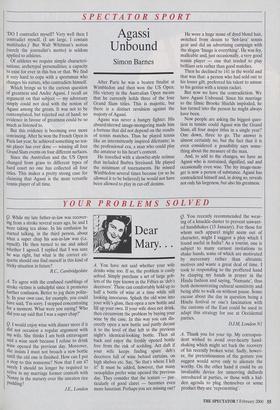SPECTATOR SPORT
Agassi Unbound
Simon Barnes
'DO I contradict myself? Very well then I contradict myself, (I am large, I contain multitudes.)' But Walt Whitman's notion (surely the journalist's motto) is seldom applied to athletes.
Of athletes we require simple characteri- sations; archetypal personalities; a capacity to exist for ever in this box or that. We find it very hard to cope with a sportsman who changes his nature, who contradicts himself.
Which brings us to the curious question of greatness and Andre Agassi. I recall an argument on that subject — my adversary simply could not deal with the notion of Agassi among the greats. It was not to be contemplated, but rejected out of hand; no evidence in favour of greatness could be so much as listened to.
But this evidence is becoming ever more convincing. After he won the French Open in Paris last year, he achieved something no ten- nis player has ever done — winning all four Grand Slam events on four different surfaces.
Since the Australian and the US Open changed from grass to different types of hard court no one has collected all four titles. This makes a pretty strong case for claiming that Agassi is the most versatile tennis player of all time. After Paris he was a beaten finalist at Wimbledon and then won the US Open. His victory in the Australian Open means that he currently holds three of the four Grand Slam titles. This is majestic, but there is a distinct revulsion against the majesty of Agassi.
Agassi was never a hungry fighter. His absurd/shrewd image-mongering made him a fortune that did not depend on the results of tennis matches. Thus he played tennis like an intermittently inspired dilettante; in the professional era, a man who could play the amateur to his heart's content.
He travelled with a showbiz-style retinue that included Barbra Streisand. He played the minimum of tournaments. He missed Wimbledon several times because (or so he allowed it to be believed) he would not have been allowed to play in cut-off denims. He wore a huge mane of dyed blond hair, switched from denim to 'hot-lava' tennis gear and did an advertising campaign with the slogan 'Image is everything'. He was fey, malleable and, just occasionally, a very good tennis player — one that tended to play brilliant sets rather than good matches.
Then he declined to 141 in the world and that was that: a person who had sold out to his lesser gift, preferred his talent to amuse to his genius with a tennis racket.
But now we have the contradiction. We have Agassi Unbound. Since his marriage to the filmic Brooke Shields imploded, he has turned into the person he might always have been.
Now people are asking the biggest ques- tion in tennis: could Agassi win the Grand Slam, all four major titles in a single year? One down, three to go. The answer is almost certainly no, but the fact that it is even considered a possibility says some- thing about the measure of the man.
And, to add to the changes, we have an Agassi who is restrained, dignified, sad and occasionally even wise. The fey image-mon- ger is now a person of substance. Agassi has contradicted himself and, in doing so, reveals not only his largeness, but also his greatness.


























































 Previous page
Previous page